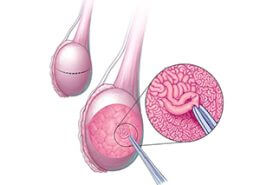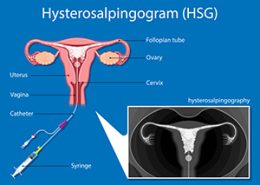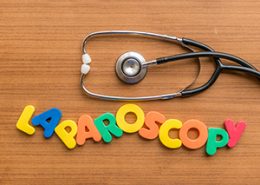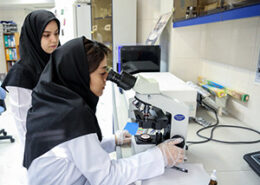Fertility Tests for Men
Male problems account for about one-third of the causes of infertility among infertile couples. Therefore, infertility treatment is not limited to examining a woman’s condition. Problems such as the inability to ejaculate or produce sperm, low sperm motility, improper shape and low quality of sperm, etc. are among the problems that cause infertility in men. Therefore, at the beginning of the infertility treatment process, it is crucial to perform tests and initial examinations of the man. The results of male tests along with the results of fertility tests for women help the specialist doctor to identify the cause of infertility and suggest an effective treatment method.
Tests that a man should do before starting the IVF process
In this article, we will introduce the tests that a man needs to do before starting the infertility treatment process. These tests should be done before any treatment, such as IUI, IVF, ICSI, and donated eggs, to identify and treat if there is a problem with the sperm or male sperm ducts.
Semen analysis or spermogram(Semen Analysis)
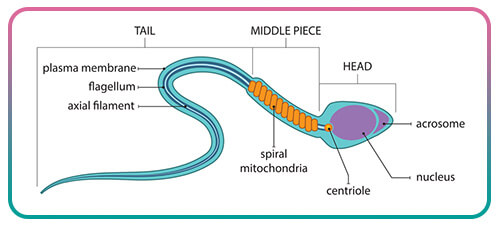
The spermogram test is the most important test to assess the health and quality of sperm. Learn more about the ways to boost sperm quality and increase fertility in men: Ways to Increase Sperm Quality
This test measures the number, shape, and motility of sperm, which are the three main factors in sperm health. A semen test helps the doctor assess a man’s fertility and determine if he is infertile. It is best not to ejaculate for 2 to 7 days before having a spermogram test. The sample test should be prepared in specialized laboratories. If this is not possible for the person, he can take the sample out of the laboratory by taking a special sample container from the laboratory. After preparing the sample, the person should deliver the sample to the laboratory by placing the sample container close to the body for a maximum of one hour.
The results of the semen test are compared with the baseline numbers announced by the World Health Organization. Therefore, the results of this test alone do not guarantee fertility or confirm infertility. The sample of natural semen is generally milky and the number of sperm per cc is at least 15 million. If 40% of all sperm are motile, at least 32% are progressive, and at least 4% of sperm are normal shape, the normal sample is evaluated. Learn more about sperm problems and their effect on male fertility: Sperm problems in male infertility
Sperm DNA Failure Test (DFI)
About 30% to 50% of male infertility cases are due to defects in sperm DNA. Many factors such as cancer, infections, high fever, high testicular temperature, drug use, smoking, alcohol consumption, stress, air pollution, occupational pollutants, poor diet, varicocele, and aging can damage sperm DNA. Therefore, sperm DNA testing is necessary to diagnose the causes of infertility. DFI test is performed to detect defects in sperm DNA. This test measures the rate of sperm DNA breakdown and measures the degree of integration or fragmentation of sperm DNA.
The results of the DFI test can help to choose the best treatment for infertility and increase the likelihood of successful treatment. The DFI test of less than 25% indicates the desired sperm DNA status, but if the DFI test result is higher than 25%, it indicates damage to sperm DNA that needs to be examined and treated. Consumption of certain medications and lifestyle modifications can help treat sperm DNA failure. In addition, replacing IVF with ICSI therapy can increase the chances of fertility in people with sperm DNA damage.

Testicular ultrasound
The testicle is part of the male reproductive system that secretes sperm and male sex hormones. Sometimes the cause of infertility in men is a problem with the testicles and sperm ducts. Testicular ultrasound is one way to diagnose testicular and duct problems. In the testicular ultrasound, images of the testicles are taken to examine the obstruction of the ejaculatory duct, the structure, and the function of the testicles.
Hormonal tests
Hormones influence many body functions, from growth, and reproduction to sleep cycles. Even a slight imbalance in the level of hormones can have a significant impact on health. Disturbances in some hormones can affect sperm production, fertility, and libido in men. Therefore, one of the steps to investigate the causes of infertility and fertility tests in men is to perform hormonal tests. Hormones that affect male fertility include:
-
Testosterone hormone
Testosterone is the primary sex hormone in men, which regulates sperm production, fat distribution, red blood cell production, etc. in the male body. Low testosterone levels affect fertility and libido in men. The normal range of testosterone for men is 300 to 1000 ng/dl. Usually, after the age of 40, the level of testosterone in men decreased by at least 1% every year.
-
FSH hormone
FSH hormone is secreted from the pituitary gland and plays an important role in sperm production in men. A sharp increase or decrease of this hormone can indicate several problems, including infertility, decreased libido, and early or late puberty. The normal range for this hormone depends on age, gender, medical history, and the method used in the laboratory, and there is no exact range. But in general, the level of FSH in men between 1.4-15.5 IU/mL is considered normal. Note that the test result alone cannot be used to diagnose the disease in people. More tests are usually needed to assess, such as LH, testosterone, and estrogen.
-
LH hormone
LH hormone plays an important role in testosterone production in the testicles. Therefore, this hormone affects male fertility. A normal LH level for men is 1.24-7.8 IU/L. High levels of this hormone in men may be a sign of primary testicular failure. Low levels of this hormone in men may lead to a decrease in testosterone, which is associated with symptoms such as poor sexual performance, decreased libido, and fatigue.
Free consultation with the best infertility treatment specialists in Iran
You can get free advice from the best fertility treatment specialists in Iran by performing the relevant fertility tests for men and women and sending the results. Our experienced specialists will help you choose the most effective method of infertility treatment by diagnosing the causes of infertility. We are with you to spend your infertility treatment with ease in the best infertility treatment centers in Iran.













